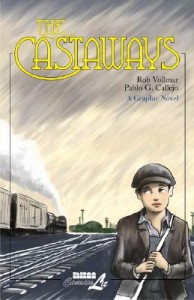 It is the height of the Depression, and thirteen-year-old Tucker Freeman’s father is gone for good. To survive, he and his family move in with the Widow, his father’s humorless and ultra-religious older sister. Convinced by the Widow that he isn’t pulling his weight on her farm, she hands him fifteen cents and tells him to hit the road.
It is the height of the Depression, and thirteen-year-old Tucker Freeman’s father is gone for good. To survive, he and his family move in with the Widow, his father’s humorless and ultra-religious older sister. Convinced by the Widow that he isn’t pulling his weight on her farm, she hands him fifteen cents and tells him to hit the road.
Tucker jumps a ride on a freight train, instead, thinking that he will head west to pick fruit and send his earnings home to his mother and little brothers and sisters. Instead, he struggles to survive, discovering that there is much more to being young, poor, and homeless.
[notice]This is a new edition which includes an epilogue not featured in the original release, which was nominated for an Eisner award in 2002.[/notice]
Response
Because I love reading about the Depression, I had been looking forward to reading this graphic novel for some time. Unfortunately, I didn’t like it as much as I hoped I would. While the main part of the story seems as if it takes days or even weeks to unfold, the addition of the epilogue seems to compress the entire story into two or three days at most. If you get to the epilogue and are happy with the story, as I was, stop reading. The story is much better with the original ending, where Tucker pulls down the “sundown” sign off the town sign.
I also didn’t care much for the graphics, which are dark and in some strange way, reminiscent of R. Crumb. I’m sure the style would be appropriate for other, more urban, stories, but they seem out of place in this book, where their quirky sense of line and seemingly motionless depictions only take away from what is a heartwarming and heart-wrenching story (save for the epilogue).
Volmarr, Rob. The Castaways. Pablo G. Cajjelo, illus. New York: Comics Lit-NBM, 2007.
https://bookblog.kjodle.net/2011/06/22/castaways-rob-vollmar/
